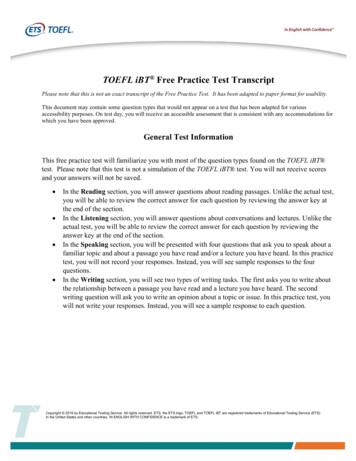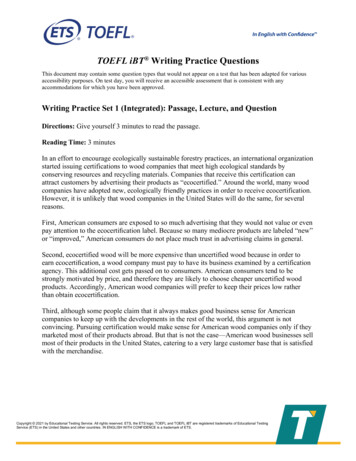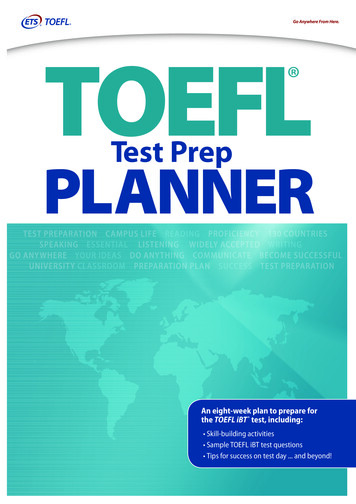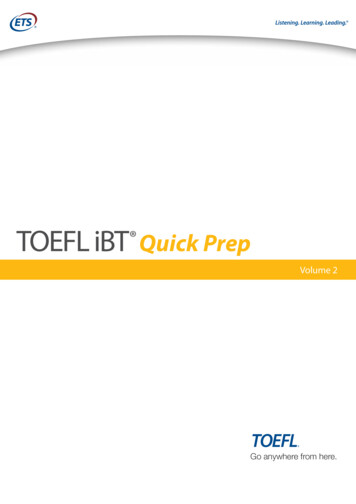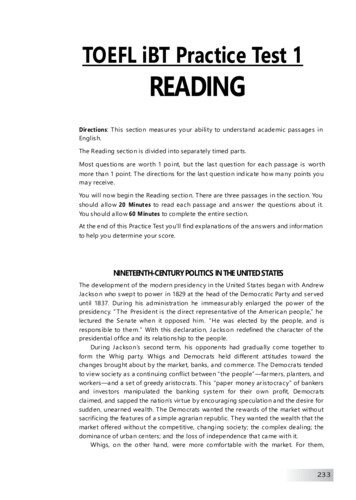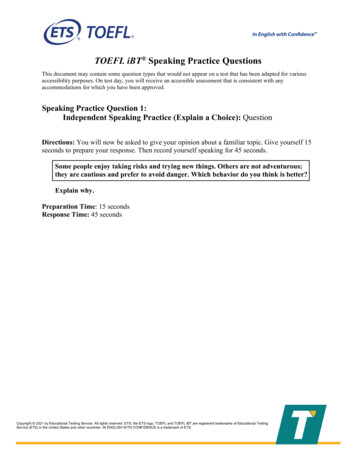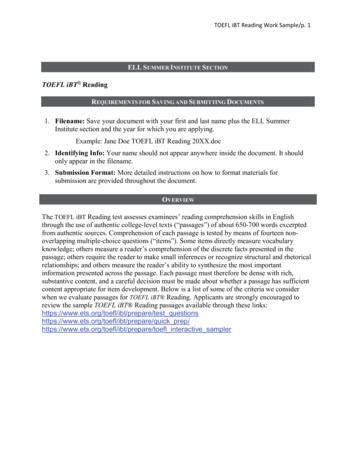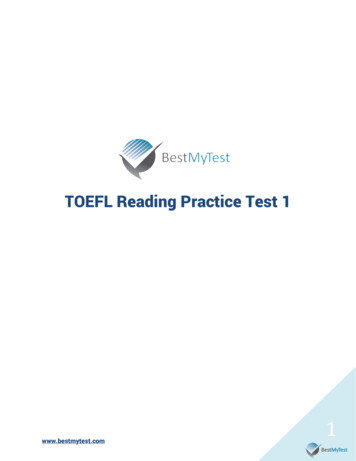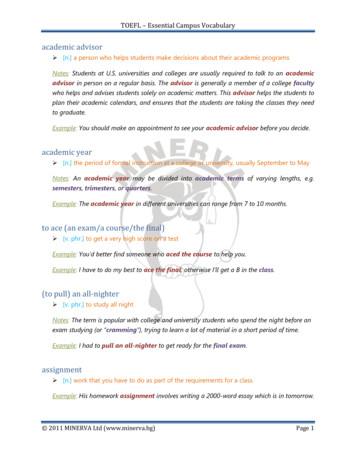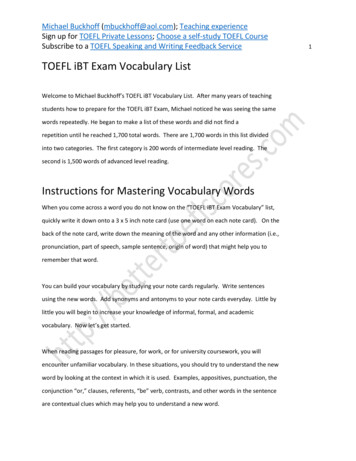
Transcription
Michael Buckhoff (mbuckhoff@aol.com); Teaching experienceSign up for TOEFL Private Lessons; Choose a self-study TOEFL CourseSubscribe to a TOEFL Speaking and Writing Feedback ServiceTOEFL iBT Exam Vocabulary ListWelcome to Michael Buckhoff’s TOEFL iBT Vocabulary List. After many years of teachingstudents how to prepare for the TOEFL iBT Exam, Michael noticed he was seeing the samewords repeatedly. He began to make a list of these words and did not find arepetition until he reached 1,700 total words. There are 1,700 words in this list dividedinto two categories. The first category is 200 words of intermediate level reading. Thesecond is 1,500 words of advanced level reading.Instructions for Mastering Vocabulary WordsWhen you come across a word you do not know on the “TOEFL iBT Exam Vocabulary” list,quickly write it down onto a 3 x 5 inch note card (use one word on each note card). On theback of the note card, write down the meaning of the word and any other information (i.e.,pronunciation, part of speech, sample sentence, origin of word) that might help you toremember that word.You can build your vocabulary by studying your note cards regularly. Write sentencesusing the new words. Add synonyms and antonyms to your note cards everyday. Little bylittle you will begin to increase your knowledge of informal, formal, and academicvocabulary. Now let’s get started.When reading passages for pleasure, for work, or for university coursework, you willencounter unfamiliar vocabulary. In these situations, you should try to understand the newword by looking at the context in which it is used. Examples, appositives, punctuation, theconjunction “or,” clauses, referents, “be” verb, contrasts, and other words in the sentenceare contextual clues which may help you to understand a new word.1
Michael Buckhoff (mbuckhoff@aol.com); Teaching experienceSign up for TOEFL Private Lessons; Choose a self-study TOEFL CourseSubscribe to a TOEFL Speaking and Writing Feedback Service2EXAMPLEExamples in the form of a word or phrase may help to explain the meaning of a word: as,case in point, for instance, for example, in fact, like, specifically, such as, and to illustrate.This outcome reflects strong sense of solidarity within the corporatepeasant community; for instance, this solidarity is apparent in the tendency foralmost every man to remain within his village over his lifetime.The meaning of solidarity is identified by the example that most men remain within their village duringtheir lifetime; therefore, you can guess that solidarity means having an identity or coincidence ofinterests, purposes, or sympathies among members of a certain group.APPOSITIVESIn some cases, an appositive [a noun or noun phrase which is set off by commas and whichmodifies another noun] can help you to identify the meaning of an unknown word.Whether psychology should be classified as a biological or social science was acontentious issue among scholars until 1960, after which time it was increasinglydescribed as a behavioral science; the science of the behavior oforganisms.The meaning of “behavioral science” is identified by its appositive, “the science of thebehavioral science.”
Michael Buckhoff (mbuckhoff@aol.com); Teaching experienceSign up for TOEFL Private Lessons; Choose a self-study TOEFL CourseSubscribe to a TOEFL Speaking and Writing Feedback ServicePUNCTUATIONPunctuation marks can be used to set off a word which is used to identify another word.Some useful punctuation marks that might help you to understand the meaning of anunknown word are the following:brackets [ ]commas,dashes –double quotation marks “ ”parentheses ( )single quotation marks ‘ ’If the wire is bent into a coil, called a solenoid, the magnetic fields of theindividual loops combine to produce a strong field through the core of the coil.The meaning of “solenoid” which is set off by commas is identified by the definition whichprecedes it: “wire is bent into a coil.”3
Michael Buckhoff (mbuckhoff@aol.com); Teaching experienceSign up for TOEFL Private Lessons; Choose a self-study TOEFL CourseSubscribe to a TOEFL Speaking and Writing Feedback ServiceTHE CONJUNCTION “OR”Sometimes “or” and a synonym immediately comes after an unknown word or phrase.Haliaeetus leucocephalus, or the Bald Eagle, is one of two eagles in NorthAmerica and the only exclusively North American eagle.The meaning of the words “Haliaeetus leucocephalus” are identified by the words “the BaldEagle” following the word “or.”CLAUSESAdjective clauses and their connectors (i.e., that, when, where, which, who, and whom)may be used to identify words.Both the electric generator, which makes electricity widely available,and the electric motor, which converts electricity to useful mechanicalwork, are based on these effects.The meaning of “electric generator” is identified by the adjective clause: “which makeselectricity widely available.” Similarly, the meaning of electric motor is identified by itsadjective clause: “which converts electricity to useful mechanical work.”4
Michael Buckhoff (mbuckhoff@aol.com); Teaching experienceSign up for TOEFL Private Lessons; Choose a self-study TOEFL CourseSubscribe to a TOEFL Speaking and Writing Feedback Service5REFERENTSReferents are words to refer to other words in a sentence or paragraph. The referent mayrefer to a previous word or one which follows it.It is one of the more remarkable feats of American literature, how a young man whonever graduated from high school, never received a college degree, living in a smalltown in the poorest state in the nation, all the while balancing a growing family ofdependents and impending financial ruin, could during the Great Depression writea series of novels all set in the same small Southern county — As I Lay Dying, Light in August, and aboveall, Absalom, Absalom! — that would one day berecognized as among the greatest novels ever written by an American.“As I Lay Dying, Light in August” and “Absalom, Absalom” can be identified by theirreferent “a series of novels.”“BE” VERBThe object, which is referred to as the subject complement and which comes afterthe verb “be,” may be used to identify the subject.The Great Horned Owl Bubo virginianus is one of Canada's commonestlarge birds of prey.The meaning of “The Great Horned Owl Bubo virginianus” is identified by “large birds ofprey,” which comes after “is.”
Michael Buckhoff (mbuckhoff@aol.com); Teaching experienceSign up for TOEFL Private Lessons; Choose a self-study TOEFL CourseSubscribe to a TOEFL Speaking and Writing Feedback ServiceCONTRASTSSometimes, the meaning of vocabulary words can be understood because they are incontrast to another word in the sentence. Some words to show contrast are the following:althoughbutdespiteeven thoughhoweverin contrastin spite ofinsteadneverthelesson the other handon the contraryorstillunlikeyetTsunamis are unlike wind-generated waves, which many of us may haveobserved on a local lake or at a coastal beach, in that they are characterized asshallow-water waves, with long periods and wave lengths.Tsunamis are understood to be “shallow-water waves” because they in contrast to “windgenerated waves.”OTHER WORDS IN THE SENTENCE6
Michael Buckhoff (mbuckhoff@aol.com); Teaching experienceSign up for TOEFL Private Lessons; Choose a self-study TOEFL CourseSubscribe to a TOEFL Speaking and Writing Feedback ServiceOther words in a sentence may also help you to understand the meaning of vocabularywords.Sponges are the simplest grade of multi-celled animals. In general, spongeshave open-topped, sack-like bodies which are fixed to the sea floor. Wateris pulled through the body, and food is filtered out.By using other words in the sentences as contextual clues, you can guess that a“sponge” is a “multi-celled animal” which is “fixed to the sea floor.”READING STRATEGYWhen encountering an unfamiliar vocabulary word, try the following:1. Read the sentence preceding the unfamiliar vocabulary word, read the sentence,inside of which the unfamiliar word in being used, and read the sentence followingthe unfamiliar word.2. Look for context clues to help you understand the meaning of the word.3. Look for examples, appositives, punctuation, the conjunction “or,” clauses,referents, “be” verb, and contrast statements as clues to help you understand theunfamiliar word.7
Michael Buckhoff (mbuckhoff@aol.com); Teaching experienceSign up for TOEFL Private Lessons; Choose a self-study TOEFL CourseSubscribe to a TOEFL Speaking and Writing Feedback Service200 Words of Intermediate TOEFL iBT VocabularyLesson FormatWord, Part of Speech, Word FormsSynonymsWord DefinitionSample Sentence1. Adorn, verb (adorns, adorning, adorned)embellish, garnish, ornament, trimFor example, if someone adorns a place, he puts decorations on it. His watercolor designs adorn awide range of books.Magnificent, adjective (magnificently, magnificence)extraordinary, glorious, grand, splendid, superb, wonderfulFor example, if you say that something or someone is magnificent, you mean that youthink it is extremely good. It is a magnificent country house in wooded grounds.2. Impressive, adjective (impressively, impress, impression)awe-inspiring, grand, moving, thrilling; something that is impressive impresses you.For example, it is great in size or in degree or is done with a great deal of skill. It is an impressiveachievement.3. Impress, verb (impresses, impressed, impressing)affect, influence, persuade, swayFor example, if something impresses you, you feel great admiration for it. What impressed him mostwas their speed.4. Deal, noun (dealer, dealings, dealt, dealing)agreement, arrangement, bargain, contract, understanding8
Michael Buckhoff (mbuckhoff@aol.com); Teaching experienceSign up for TOEFL Private Lessons; Choose a self-study TOEFL CourseSubscribe to a TOEFL Speaking and Writing Feedback Service9For example, if you say that you need or have a great deal of or a good deal of a particularthing, you are emphasizing that you need or have a lot of it. I’m able to save you a good deal of time.5. Throughout, prepositionFor example, if you say that something happens throughout a time, you meanthat it happens during the whole of that period. The national tragedy of rival groups killing each othercontinued throughout 1990.6. Tragedy, noun (tragic, tragically)calamity, catastrophe, disaster, misadventureFor example, a tragedy is an extremely sad event or situation. They have suffered an enormouspersonal tragedy.7. Involve, verb (involved, involves, involving, involvement)comprise, consist of, contain, entail, includeFor example, if a situation or activity involves something, that thing is a necessary part orconsequence of it. Running a kitchen involves a great deal of discipline and speed.8. Run, verb (runs, ran, running)function, operate, administer, control, govern, and manageFor example, if you run something such as a business or an activity, you oversee itor you organize it. His stepfather ran a prosperous paint business.9. Discipline, noun (disciplines, disciplining, disciplined)chastisement, correction, punishment, control, moderation, restraint Order and discipline have beenplaced in the hands of headmasters and governing bodies.10. Consequence, noun (consequences, consequently)aftermath, effect, price, repercussion, result
Michael Buckhoff (mbuckhoff@aol.com); Teaching experienceSign up for TOEFL Private Lessons; Choose a self-study TOEFL CourseSubscribe to a TOEFL Speaking and Writing Feedback Service10For example, the consequences of something are the results or effects of it. Her lawyer said sheunderstood the consequence of her actions and was prepared to go to jail.11. Stepfather, nounSomeone’s stepfather is the man who has married a child’s mother after the death ordivorce of his father. Her stepfather has been married to her mother for five years.11.1 Enormous, adj (enormously) big, giant, huge, immense, jumbo, tremendousFor example, something that is enormous is extremely large in size or amount. The main bedroom isenormous.12. Rival, noun, verb (rivals, rivaling, rivaled)challenger, competitor, contender, adversary, enemyFor example, your rival is a person, business, or organization against whom you arecompeting or fighting in the same area or for the same things. He eliminated his rival in brutal strugglefor power.13. Compete, verb (competes, competing, competed, competition, competitive, competitively)contend, contest, rival, vie, combat, fight, strive, oppose;For example, when one firm or country competes with another, it tries to get people to buy its owngoods in preference to those of the other firms or countries. You can also say that two firms or countriescompete. The banks have long competed with American Express’s charge cards and various store cards.For example, if you compete with someone for something, you try to get it for yourself and stop theother person from getting it. You can also say that two people compete for something. Kangarooscompete with sheep and cattle for sparse supplies of food and water.14. Preference, noun (preferences prefer, preferred, preferably)choice, desire, favorite, option, selection
Michael Buckhoff (mbuckhoff@aol.com); Teaching experienceSign up for TOEFL Private Lessons; Choose a self-study TOEFL CourseSubscribe to a TOEFL Speaking and Writing Feedback Service11For example, if you prefer something, you would like to have or do that thing rather than somethingelse. Many or these products were bought because customers preferred them.15. In preference to, noun phraseIf you choose one thing in preference to another, you choose it instead because it is better. Manypeople choose the train in preference to driving.16. Engrave, verb (engraves, engraving, engraved)For example, if you engrave something with a design of words, or if you engrave a designor words on it, you cut the design or words onto its surface. Your wedding ring can be engraved with apersonal inscription at
TOEFL iBT Exam Vocabulary List Welcome to Michael uckhoff’s TOEFL iT Vocabulary List. After many years of teaching students how to prepare for the TOEFL iBT Exam, Michael noticed he was seeing the same words repeatedly. He began to make a list of these words and did not find a repetition until he reached 1,700 total words. There are 1,700 words in this list divided into two categories. The .
